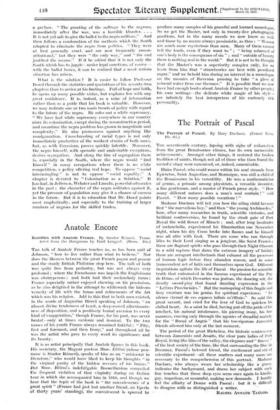Anatole Encore
'Rambles with Anatole France. By Sander Kemeri. Trans- lated from the Hungarian by Emil Lengyel. (Berm. 16s.) THE talk of Anatole France teaches us, as has been said of Johnson, "how to live rather than what to believe." Nor does the likeness between the great French pagan and poseur and the sturdy British Philistine stop here. The talk of both was quite free from pedantry, but was not always very profound ; where the Frenchman was impish the Englishman was obstreperous ; and both had their melancholy turns ; France especially rather enjoyed chewing on his pessimism, as he also delighted in the attempt to whitewash the hideous veracity of life with the forms and refinements of the Art which was his religion.. Add to this that in both men existed, in the words of Augustine Birrell speaking- of Johnson, "an almost divine tenderness of heart, a deep-rooted affectionate- ness of disposition, and a positively brutal aversion to every kind of exaggeration," though France, for his part, was never brutal—only at times sardonic and ironical. To the two muses of his youth France always remained faithful "Pity,' first and foremost, and then Irony," and throughout all he was the artist who gave to every word its significance and its beauty.
It is as artist principally that Anatole figures in this book. Ills secretary, the Magyar poetess Mme. Eoliini (whose 'pen- name is S(sndor Kemeri), speaks of him as an "aristocrat in literature," who would have liked to keep his thoughts " in the virginal purity of the hidden recesses of his brains." But Mme. Biikini's indefatigable Boswellianism compelled the -frequent violation of that virginity during an Italian tour in which she accompanied him in 1910, and though we hear that the topic of the book is "the convalescence of a great spirit" (France had just lost another friend, an Egeria
of thirty years' standing), the cOrivalescent spurred to
produce many samples of his graceful and learned monologue. So we get the Master, not only in twenty-five photographic positions, but in the many moods we now know so well, and those by no means always pessimistic, as thus : "Women arc much more mysterious than men.. Many of them cannot tell the truth, even if they want to" ; "being ashamed of one's body is the consequence of sin " ; and" outside of beauty there is nothing real in the world." But it is not to be thought that the Master's was a superiority complex only, for we learn from him that "strawberries are hest with powdered sugar," and we behold him during an interval in a monologue on the mosaics of Ravenna pausing to take " a glass of mineral water from our thermos." It is possible that we now have had enough books about Anatole Fraiiee by other people ; his own .writings—the delicate white magic of his style— are infinitely the best interpreters of his • curiously rich personality.






























































 Previous page
Previous page